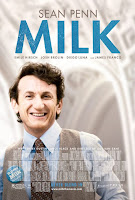
Milk, directed by Gus Van Sant and starring Sean Penn as the title character, is a biopic about Harvey Milk, the first openly gay man elected to major public office in the US. The film centers on the decade (the '70s) when Milk ran and eventually became a city supervisor of San Francisco. During this time, Harvey Milk fought for gay civil rights and successfully defeated a proposition that would've banned homosexuals from teaching in public schools. Tragically, Harvey Milk was assassinated along with San Francisco mayor George Moscone in 1978 by former city supervisor Dan White.
Kinsey and I were both looking forward to this film and we were not disappointed. Gus Van Sant has crafted a great film with a cast that totally embodies their characters. The acting was really superb in this film. Sean Penn has got to be a lock for a Best Actor nomination. When you look at Penn's performance alongside video of Harvey Milk, it is astounding. Not only are the mannerisms and speech patterns spot-on, but wholly taps into Milk's mood and personality. He doesn't play Milk, he becomes Milk. James Franco, Josh Brolin, Alison Pill all give great supporting performances, with some spotty jobs tossed in by Emile Hirsch and Diego Luna. The supporting role that really stood out to me was Josh Brolin's portrayal of Dan White, Milk's eventual assassin. Brolin plays White as this pathetic, tortured soul, who only wants to be included. The character almost comes off as childlike, which makes him all the more complex when he eventually murders two men. What a great run Brolin has had the last couple years. First a great, overlooked performance in No Country for Old Men, then the only semi-decent thing about American Gangster, and this year, a subtle performance in W. and now, Milk.
The only issue I had with Milk was the subservience to the genre of the biopic. Kinsey and I are familiar with Gus Van Sant's mainstream work like Finding Forrester and Good Will Hunting and I am at least familiar with the critical opinions of his more art house fare like Elephant, Paranoid Park, and Last Days. The thing most shocking about Milk was how much it was mainstream Van Sant and not art house Van Sant. I guess I was expecting more of vision like Todd Haynes' presented in his Bob Dylan biopic I'm Not There. Not that mainstream is bad, or that it makes Milk anything other than a great film, its just a little surprising considering the director. And the main thing that bothered me was a couple standard biopic framing choices. One was the framing device of having Milk describe his life into a tape recorder, and then having basically flashbacks appear showing those life descriptions. It just seemed like too easy of a way to move the film along. And the other one was the standard "what happened to them later" text and pictures at the end of the film, you know, where they show a picture of a character and say that they went on to do so-and-so later in life. That seems like standard fare for biopics now and for some reason it just bothers me. Show what you want to show in the film and don't make me have to read anything at the end.
But, overall, Milk is a great movie and definitely one of the better films we've seen this year.
Wade: 4 stars
Kinsey: 4.5 stars




